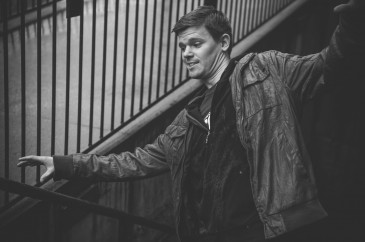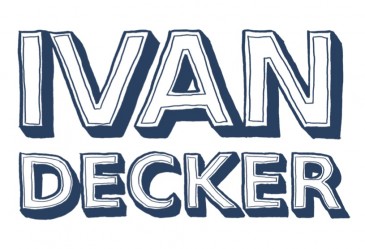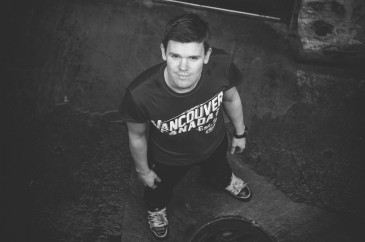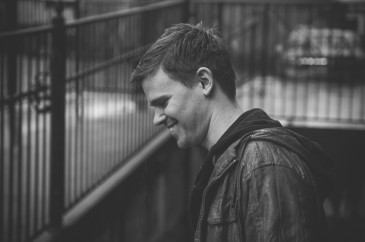
Standing at the heart of Vancouver’s stand-up scene is Ivan Decker, a 27-year-old middle child who just wants to make people laugh. Decker began stand-up at 19, debuting at Yuk Yuk’s (now the Comedy Mix) on Burrard to a less-than-thrilling reaction. “My first time on stage was okay,” says Decker. “After that, my second night, I got booed off stage, which I thought was something that would happen commonly. I was like, ‘Oh yeah, this probably happens to people. Whatever.’ And in the eight years that I’ve been doing comedy since then, I’ve never seen that happen to anyone else at that club, ever.”
Despite this early setback, Decker strode on, simply craving the feeling of comedy and its process. While many working comedians can coast on their constructed stand-up hour for years, Decker explains that he feels an obligation to constantly improve and update his material, to engage in the craft of comedy. While he has other pursuits that include sketch comedy, improv, scene work, and a potential sitcom script he’s working on with local comedian Adam Pateman, Decker’s first love remains stand-up.

“That’s why live shows are so great,” says Decker, defending stand-up like it’s under siege. “You’re always going to be able to find something funnier than me on YouTube. I mean, you can watch ten minutes of people getting kicked in the nuts at home. So you don’t need to come out to a comedy show, but it’s that ‘together’ experience that makes it so amazing. When you’re like, ‘How can I say something that will make everyone in this room come together and laugh?’”
Decker recently quit his day job at Science World to become a full time working comedian. The hours he’s put in on the road and in various clubs have fostered many insights into the practice of stand-up. Speaking from experience, he states, “There’s a big difference between city audiences and small town audiences, because as a working comedian, well, get ready to go to a lot of places that don’t like observational material. You better be ready to tell dick jokes or they’re going to stab you in the face.” And discussing his experience with hecklers, Decker states, “I was told this very early in stand-up. You should never ask a question you’re not prepared to not get the answer you want.”
Decker, on his worst show:
“It was in Williams Lake, B.C., and the local radio station had this idea to do a thing called the “Rolling Stones Stone-Face Contest.” I was the opening act. I was only supposed to do 20 minutes. I had never done comedy outside the city before. I was 19 years old. The “Rolling Stones Stone-Face Contest” was a group of 20 people who were selected to sit in the front row of a comedy show and not laugh. If they could keep a ‘stone-face,’ they would win Rolling Stones tickets. So you’ve already got 20 people purposely not enjoying the show. And they were allowed to close their eyes, so they’re all squinting and they’ve got their palms mashed against their eyes. And another thing was that there were rows of people with their back to the stage looking at those people’s faces to make sure they don’t crack a smile and laugh. So now you’ve got 40 people not enjoying the show, and they’re up front. And at the back of the show, they didn’t even set up tables. There’s just people walking around in the bar and they’re telling people, ‘Well, if you want to come up and mess with these people, that’s cool too.’ And I was thinking, this is not the environment for stand-up.”

Recently, Decker took part in a new project that has challenged the way stand-up is being delivered online. Following Louis C.K.’s model of DRM-free, online comedy special distribution, local comic and stand-up producer Paul Breau brought together ten comedians, including Graham Clark, Erica Sigurdson, and Peter Kelamis, to record full sets at the now defunct Waldorf Hotel. Those sets were then put online, culminating in a project called The Stand Up Comedians.
In this new age of comedy, stand-up is being delivered straight to the viewer from the comic. And while this idea of direct online distribution appeals to Decker, his next goal is to develop something physical to give away as well, to complement his online presence. “I like the idea of a CD, actually,” Decker says, “Because videos, as much as people like them, their attention spans are too short for something like that. Most people are like, ‘Alright, now I’ve got to set aside an hour to watch this.’ That’s hard to find nowadays. With a CD, you can listen to it on the bus, on the train, whenever you’re going to places.”

While stand-up is Decker’s muse, he’s pursuing other forms of comedy as a way of diversifying his talents. “I’ve looked at where just stand-up will take you in Canada,” says Decker. “It will take you to northern parts of provinces to entertain oil riggers or to England.” To combat this, Decker has begun taking improv classes with Instant Theatre’s Conservatory program and performed his first improv show in January.
Before he began classes, Decker’s improv skills were very much influenced by his stand-up mentality. “When I tried to do improv before I had any training,” says Decker, “I would just destroy improv scenes, because I would find whatever the fastest joke was, but it would kill the scene. I’d be like, ‘I’m actually a totem pole,’ and everyone else is like, ‘What? Where do we go with this now? You’re just not in the scene anymore? I hate you.’”
One can see why Decker is a rising star in Vancouver’s comedy scene. He’s deeply committed to what he does and strives to improve himself at every turn. But all in all, it comes down to Decker’s simple love for comedy. “I’m a huge fan of laughing because it’s just this pure emotional response of happiness,” says Decker. “And yes, I know that makes me sound like a crystal hippie.”
Decker will be headlining the Comedy Mix from March 28-30. Visit thestandupcomedians.com to download specials by Decker and other Vancouver funny folks.

